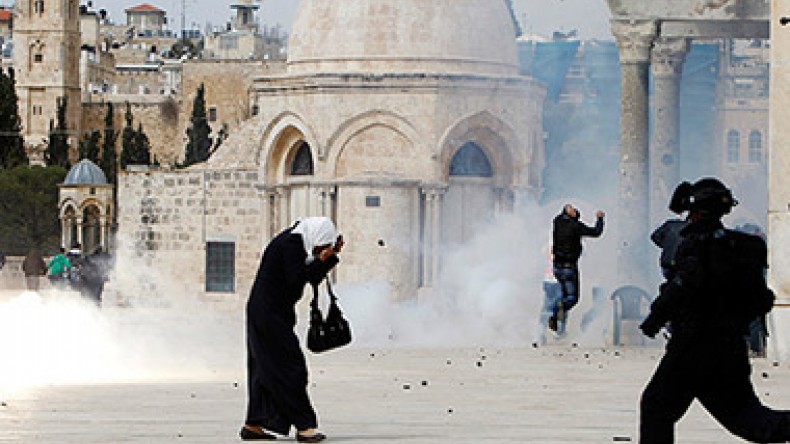
‘New wave of Israeli-Palestinian tension might develop into new intifada’
The conflict between Israel and Palestine might end up in a new intifada if Israel doesn’t stop its provocation by closing Palestinian holy places and continuing its settlement policy, Dr. Ghassan Khatib from Birzeit University told RT.
Tension between the Israelis and Palestinians has been growing in recent weeks. Tonight a mosque has been set on fire on the Israeli-occupied West Bank. Locals blame extremist Israeli settlers, adding that the same kind of accident happened two years ago in the same area.
The arson at the mosque was preceded by the stabbing of an Israeli woman and an IDF soldier on November 10, and the killing of a Palestinian man by the Israeli soldiers the day after. The Israeli Prime Minister Netanyahu has promised to demolish the houses of the Palestinians who allegedly carried out the deadly attacks.
A previous wave of escalation took place on October 30 when Israel closed the Al-Aqsa Mosque without any reason, which was called by the Palestinian leader Mahmoud Abbas a “declaration of war.”
Abbas has also warned Israel to stay away from Al-Aqsa and has accused it of “leading the region and the world to a destructive religious war.”
Dr. Ghassan Khatib from Birzeit University in Palestine told RT that the policy pursued by Israeli officials is “the wrong recipe,” which “has been tried all the time by the Israeli occupation forces but it only, fueled further the already tense situation and relations between the Palestinian people and their occupiers.”
“Actually this wave of violence and protests came in particular as a response to Israeli attempts to allow Jewish extremists and settlers to enter the Palestinian Al Haram Sharif mosque and Israeli attempts to change the status quo in some of the Islamic holy places in East Jerusalem,” Khatib explains.
He claims the tension could be calmed down if Israel abandons its rhetoric of illegal changes and settlement expansion. At the same time he warns that “reacting to these illegitimate ways of violence by violence is a wrong approach,” and any hasty actions or reactions could lead to a new intifada.
“If it is handled wisely by the Israeli occupation authorities, it might calm down. Number one, we need Israel to stop the attempts of the Jewish extremists to change the status quo in the Islamic holy places. Number two, Israel should refrain from violent reactions that can bring down the growing tension. But if Israel insists on these attempts to change the status quo in holy places and continue to react violently, continue to allow extreme Jewish settlers to exert violence against Palestinian villagers. Then it might develop into another intifada,” Ghassan Khatib told RT.
Palestinian politician and activist Mustafa al-Barghouti describes the current situation as apartheid of the Palestinians.
“More and more Palestinians see that there is a system of apartheid and discrimination that is affecting them,” he said.
Al-Barghouti argues that closing of Al-Aqsa and the Temple Mount has nothing to do with the security problem as the Palestinians turned out to be the only ones who are prohibited from entering the holy site.
“I’m sure Israel cares about the security of Jewish people more than they do about Palestinians. Yet they are not preventing any Jewish people from going to the Temple Mount, on the contrary, they facilitate their access, while they are restricting Palestinians from entering their own mosque [Al-Aqsa] and allowing Israeli illegal and extreme elements to enter the mosque under the protection of the Israeli army and provoke the Palestinians there. In reality we are talking about double standard, a discriminatory system,” he told RT.
The underlying reason for the violence, according to Mustafa al-Barghouti, is the occupation of Palestine by Israel. He argues that the situation won’t change for the better till the occupation is over, which is to happen one day.
“The problem and core of these violent actions on any side is the fact that Palestine is under Israeli occupation. Everybody says the occupation has to end, everybody says that Israel is conducting illegal settlements there, yet Israel is not changing its policy. As long as there is an occupation, there will be a cause of tension and a cause of problems in the region,” Mustafa al-Barghouti told RT.
Ghassan Khatib shares the same point of view, adding that resolution of the conflict requires interference from outside.
“Most probably we will see further actions and reactions that will cause more and more deterioration. The only way out is interference from outside. If the big friend of Israel, the US, interferes and convinces Israel, and they can if they want, then probably we’ll see other results,” he said.
Newsfeed
Videos






























